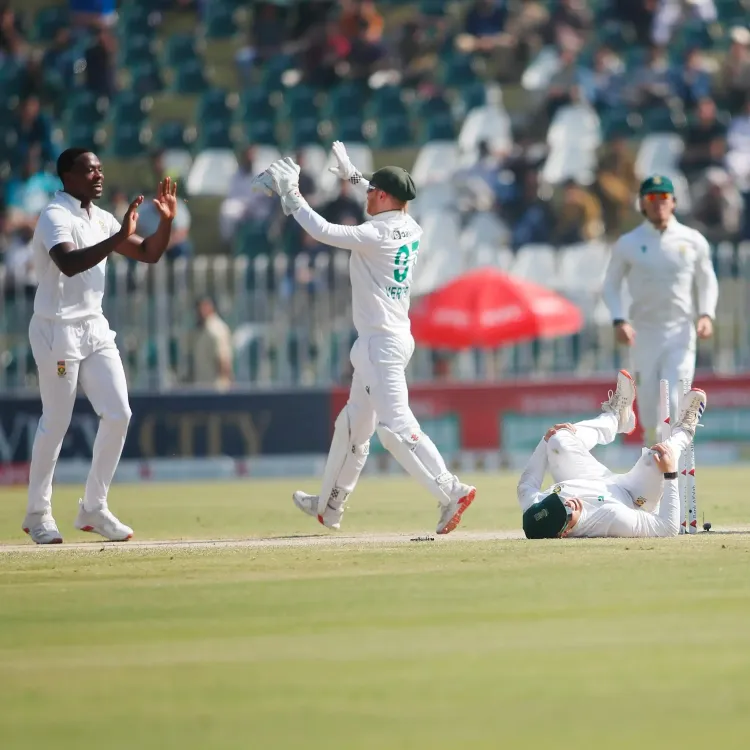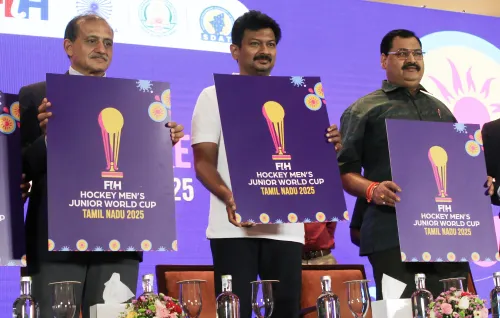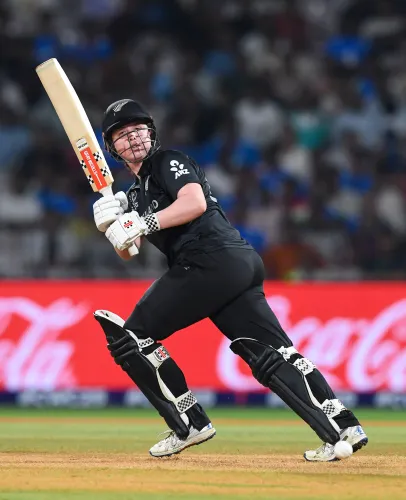Is Rabada’s Praise for Subcontinent Victory a Sign of South Africa’s Growth?

Synopsis
Key Takeaways
- Rabada's performance highlights the importance of aggressive play.
- The spin department proved effective in subcontinent conditions.
- The younger players showed resilience under pressure.
- South Africa's recent successes indicate a shift in their performance in Asia.
- This victory may shape the team's future direction in international cricket.
Rawalpindi, Oct 23 (NationPress) Kagiso Rabada regarded South Africa's victory in Rawalpindi as one of the most significant moments of his career, affirming that the team has successfully unlocked the mysteries of the subcontinent. "This win is undoubtedly one of the highlights of my career," Rabada remarked following South Africa's series-equalizing win against Pakistan. "Securing a Test match victory outside Bangladesh in the subcontinent is quite remarkable. It undoubtedly boosts the team's confidence. Moreover, we have a relatively young squad that is eager to put in the hard work."
Historically, the team faced challenges in Asian conditions, suffering 10 defeats in 11 Tests across tours to India, Sri Lanka, and Pakistan from 2015 to 2021. This win signifies a pivotal advancement for South Africa. The triumph in Rawalpindi is their third win in four Tests in Asia, following a successful 2-0 series victory against Bangladesh last year, which players have since labeled as a turning point in their World Test Championship journey.
Rabada, who played a key role as one of the few fast bowlers in the two Tests, made a significant impact with the bat this time. His career-best performance of 71 runs off just 61 balls, which included a critical 98-run last-wicket partnership with Senuran Muthusamy, turned the match in South Africa's favor.
The innings showcased an aggressive approach that disrupted Pakistan's control over the game. "We aimed to play aggressively, as merely waiting for a bad ball often leads to getting out from a good one," Rabada explained. "It was crucial for the batting unit to assert the shots they wanted to play, thereby putting pressure on the opposition and forcing them to pull fielders back, allowing us to rotate the strike."
This innings also earned him a new bat due to a light-hearted agreement with teammate David Bedingham. "We have this deal where if I score 30 runs, he'll gift me a bat since we share the same batting sponsor," Rabada chuckled. "He thought his money was safe after my performance in the first Test, but that made it even more enjoyable."
Despite taking few wickets in Rawalpindi, Rabada found fulfillment in the discipline and teamwork essential on such pitches.
"As a fast bowler, if things aren't going your way, it's about maintaining pressure or finding the occasional wicket while slowing down the scoring rate," he stated. "This creates opportunities for spinners to excel. While I may not have received many rewards myself, I was more than content to perform the role I did."
Rabada specifically commended South Africa's spin trio—Keshav Maharaj, Simon Harmer, and Senuran Muthusamy—who were instrumental in claiming the majority of the wickets. "We arrived here with exceptional spinners, and their performance was a major highlight," he noted.
"The batters also rose to the occasion. Rickelton faced pressure coming into this Test series. Stubbs had his own pressure but contributed significantly. Tony (de Zorzi) returned under scrutiny and was the only centurion of the series."
Rickelton, who has faced criticism after a poor run since the WTC final, made vital contributions. Stubbs, who had struggled for runs, scored a crucial 76, while de Zorzi, regaining his Test position, stood out as the sole centurion of the series. Their performances helped South Africa extend their dominance since the makeshift team's 2-0 loss in New Zealand last year, achieving 10 wins in their last 12 Tests.
"To achieve results like this, you must be doing many things right," Rabada concluded.









